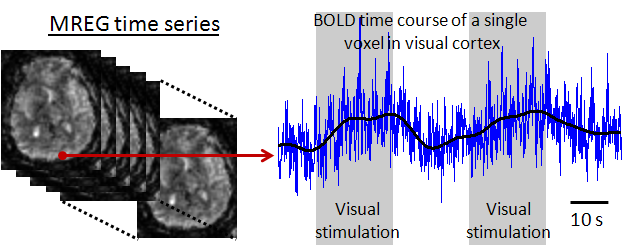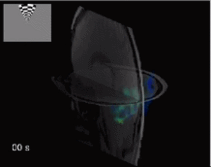Advanced Brain Imaging
MR-EncephalographyFunctional magnetic resonance imaging (fMRI) investigates the activity of brain structures during various tasks. When neurons perform an activity, there is a local increase in oxygen consumption and blood flow, resulting in local changes in deoxyhemoglobin concentration. This so-called BOLD (blood oxygenation level dependent) effect can then be detected with MRI because deoxyhemoglobin is paramagnetic. A typical fMRI scan consists of continuously acquiring several brain images, and identifying brain areas that show significant changes in response to a given task, such as visual stimulation. With standard EPI (echo-planar imaging) acquisition methods, a whole-brain image is obtained approximately every 2 to 3 seconds.

Due to the limited temporal resolution of EPI, it is only possible to track relatively slow changes in hemodynamic activity. Moreover, physiological artifacts such as breathing (~0.3 Hz) and heart pulsatility (~1 Hz) appear as aliased time courses, contaminating the BOLD signal. Our group is developing MR-Encephalography (MREG), which allows 3D whole-brain imaging at a temporal resolution of 100 ms, with only a slight loss in spatial resolution. This ultra-fast fMRI technique is based on multi-channel parallel acquisitions with fast k-space trajectories and iterative image reconstruction. The following results for a visual stimulation experiment show time courses with a much higher temporal resolution and un-aliased respiratory and cardiac noise. These physiological artifacts can then be easily filtered out (black trace).

Applications
With the high temporal resolution of MREG, we can track BOLD changes in real time, such as in the following retinotopy experiment, where a subject is scanned while being presented with a rotating checkerboard wedge on a computer screen. During a single rotation of the wedge lasting 30 seconds, we can clearly see the BOLD response travelling through the brain regions corresponding to the various parts of the visual field.
Tel.: +49 761 270-93750
E-Mail: thomas.lange@uniklinik-freiburg.de
University Medical Center Freiburg
Dept. of Radiology · Medical Physics
Killianstr. 5a
79106 Freiburg



